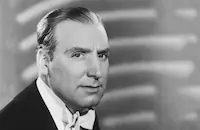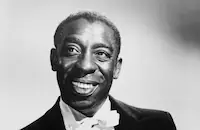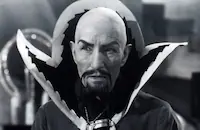Way Down South

Brief Synopsis
Cast & Crew
Bernard Vorhaus
Bobby Breen
Alan Mowbray
Ralph Morgan
Steffi Duna
Clarence Muse
Film Details
Technical Specs

Synopsis
In pre-Civil War Louisiana, plantation owner Timothy Reid is a generous man who values kindness to his slaves over the pursuit of profit. When Timothy dies in a carriage accident, the executorship to Timothy's nearly bankrupt estate is assigned to unscrupulous attorney Martin Dill. Dill, goaded by his greedy mistress Pauline, decides to sell the slaves and other assets of the plantation and depart for Paris with the proceeds. Meanwhile, Timothy's son Tim, who has inherited his father's good nature, appeals to innkeeper Jacques Bouton for help. Bouton befriends the boy and presents his case to Judge Ravenal. Upon hearing the facts, the judge intervenes to prevent the sale of the slaves, relieves Dill of his power, and thus saves the plantation.

Director
Bernard Vorhaus
Cast
Bobby Breen

Alan Mowbray

Ralph Morgan

Steffi Duna

Clarence Muse
Sally Blane
Edwin Maxwell

Charles Middleton
Robert Greig
Lillian Yarbo
Stymie Beard
The Hall Johnson Choir
Jack Carr
Marguerite Whitten
Crew
Barney Briskin
Albert Deanno
Arthur Hilton
Langston Hughes
Langston Hughes
Hall Johnson
Sol Lesser
Clarence Muse
Clarence Muse
Clarence Muse
Clarence Muse
Lewis J. Rachmil
Charles Schoenbaum
John Sherwood
Lee Sholem
Richard Van Hessen
Vernon L. Walker
Victor Young

Videos
Movie Clip


Film Details
Technical Specs

Award Nominations
Best Score
Articles
Way Down South
Way Down South was designed as a vehicle for child star Bobby Breen, then 12 years old, whose career would come to an abrupt end as he hit puberty and his soprano singing voice did not mature well. Breen plays Tim Reid, an orphan who wants to assume control of his late father's Louisiana plantation, which has been taken over by crooked attorney Martin Dill (Edwin Maxwell) and his greedy mistress (Steffi Duna), who want to sell the slaves and skip off to Paris with the proceeds. Tim is able to set things straight with the help of a Cajun innkeeper (Alan Mowbray); kindly slave Uncle Caton (Muse); and Gumbo (Little Rascal Matthew "Stymie" Beard), a slave boy who is Tim's age.
The melodramatic plot leaves plenty of time for musical numbers, which include two songs written by Hughes and Muse -- "Good Ground" and "Louisiana" -- plus such old-time spirituals as "Nobody Knows the Trouble I Seen," "Peter, Go Ring Dem Bells," "Sometimes I Feel Like a Motherless Child" and "Lord, If You Can't Come, Send One Angel Down." The film won an Oscar® nomination for Victor Young's musical scoring.
Way Down South marked one of the first times a black performer -- Muse -- received star billing in a film. According to some reports, he also shared directing chores on the movie with Bernard Vorhaus. Muse (1889-1979), was born in Baltimore, Maryland, and played some 150 roles in feature films in addition to his work as a theatrical entrepreneur, director, songwriter, playwright and television actor. Some segments of the black community have complained that, early in his career, Muse portrayed demeaning representations of black characters. But, in the words of Donald Bogle, a historian of black cinema, "The fact that [Muse] played ["Uncle Tom"] characters cannot be denied. The fact that he played them with great intelligence and thoughtfulness has often been overlooked."
Hughes (1902-1967) wrote critically acclaimed poetry, novels, short stories, plays, operas, essays, works for children and two autobiographies. A few of his works were adapted for the screen, including his autobiography The Big Sea, which was filmed as Salvation (2003). His poetry and fiction centered on the lives of African Americans, promoting equality and celebrating black culture, humor and spirituality.
Director Vorhaus had an interesting history of his own. Born in Germany in 1898, he fled the Nazis to settle in the U.S., where he enjoyed a successful filmmaking career until he was named a communist, blacklisted and brought before the House Un-American activities. This time he fled to London, where he lived until his death -- at the age of 102.
Producer: Sol Lesser
Director: Bernard Vorhaus
Screenplay: Langston Hughes, Clarence Muse
Cinematography: Charles Edgar Schoenbaum
Art Direction: Lewis J. Rachmil
Original Music: Langston Hughes, Clarence Muse, Victor Young Editing: Arthur Hilton Cast: Bobby Breen (Tim Reid), Alan Mowbray (Jacques Bouton), Clarence Muse (Uncle Caton), Ralph Morgan (Timothy Reid), Steffi Duna (Pauline), Sally Blane (Claire), Edwin Maxwell (Martin Dill), Charles Middleton (Cass), Matthew "Stymie" Beard (Gumbo).
BW-62m.
by Roger Fristoe

Way Down South
Quotes
Trivia
Notes
According to a news item in Hollywood Reporter, Clarence Muse signed a contract for his services as actor, technical adviser and dance director on this film. Another news item in Hollywood Reporter adds that the film was shot on location at Providencia Ranch, Universal City, Uplifters Ranch, Santa Monica and Stratton Ranch, Calabasas, all in California. Victor Young was nominated for an Academy Award in the Music (Scoring) category.

Miscellaneous Notes
Released in United States 1939
Released in United States 1939













